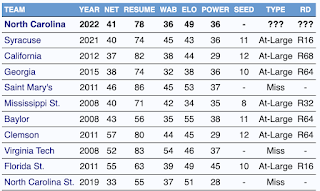It's February, so bracketologizing and bubble watching are getting into high gear. (If you're keeping track, it's the fourth-most wonderful time of the year according to my seasonal analytics.)
One of the more interesting résumés at the moment is North Carolina's. For the most part, UNC looks like a team that is directly on the bubble:
But there's a glaring goose egg sitting there: 0–7 in the almighty "Quadrant 1" games. Sure, they're 4–0 in the semi-mighty "Quadrant 2" games, but the punditry is unanimous: Carolina just can't dance without at least one Quad 1 win.
I've got some quibbles with this Quad 1 absolutism.
First, it's really not unprecedented for a team with this type of résumé to make the tournament. It's true that no sQuad Zero has made the tourney since the invention of explicit quadrants in the 2017-18 season. But that's just three tournament selections, and for the record there were three teams invited with just one Quad 1 win in even this short period:
Nevada even got a 7-seed with just one Q1!
Yet just as three is greater than two, one is greater than zero. Perhaps infinitely so. This gets me to the real meat of my Quibble 1: the quadrants existed in spirit looooong before 2018. If you were alive back then, you will remember that the selection committee focused on something different but really the same: top 50 wins and top 100 wins. I can tell you with absolute certainty that the committee used top 50 RPI wins the same way they use Quadrant 1 wins now. The only difference was that our beloved quadrants flex for home and road, as they should. The quadrants were a big improvement, but were just a tweak of the familiar paradigm. For example, here's the 2015 Selection Sunday "Nitty Gritty" sheet showing the proto-quads (with a spoiler alert):
This means we can safely look back before 2018 to get actionable intelligence about the plausibility of a 0Q1 team making the tournament. What we find is that there is indeed precedent for teams making the tournament with zero top line wins:
One other thing you might notice about each of these teams is that they all had multiple bad losses (outside the RPI top 100 in those days) and still got in. Anyhow, unsurprisingly, three of these four teams show up in the default list of ten most similar résumés for North Carolina 2022 on my site:
Georgia in 2015 is almost an exact match, particularly in the categories that matter most. There you have it. It's been done. It could happen again.
On to my second, more fundamental, quarrel with Quad 1 absolutism: Quadrants are kind of dumb! Which would be okay if we needed them, but we don't!
Long, long ago, in a time before the NET, I wrote on this very blog that:
Alas, the NCAA did not do this. First, they invented the home-road affected quadrants, and then they replaced RPI with NET. Both of these changes made the selection process better. I'm a fan of NET, relatively speaking. For judging the quality of a team's wins and losses, which is what they are basically using NET and the Quadrants to do it works pretty well.
But what they really should do is use the NET to calculate an official NCAA version of WAB or Strength of Record. I think they shouldn't even publish the NET at all—just use it behind the scenes as the backbone for the simple calculations required to turn it into a strength of record ranking.
They should do this because there are more than four levels of opponents in NCAA Division 1 basketball. In fact, there's probably at least 100 levels. Pretending like there are only four different kinds of wins and losses might make sense if we didn't have good ways to rate teams and didn't have computers to do calculations for us. But thankfully we have those things, and lots of them. We can do this. We should do this.
To bring this back to UNC, we know that the Tar Heels would be in much better shape under any system that more rationally quantified the impressiveness of their record. We can see that they're a lofty 26th in ESPN's Strength of Record, which is one attempt at the kind of system I'm arguing for. They're a solid 35th in my own superior T-Rank-based WAB rankings. They'd still face scrutiny because of their particularly heinous performances against the best teams they've faced, but at least they wouldn't have to face the (false, actually) argument that inviting them would be totally unprecedented.




